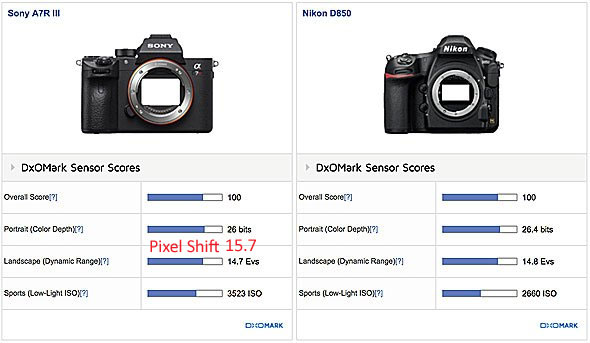![]()
The most interesting thing related to Sony A7 R III (Amazon B&H) camera is its dynamic range increases over 1 stop when the camera captures images in pixels shift mode.
In the graph (created by Photons to photos) you can clearly see that the dynamic range of the camera increases over 1 Stop. Which is really a surprise gift for A7R III Landscape shooters.
So, if we put one more stop of dynamic range at A7R III test scores then Nikon D850 fails miserably. If I have to choose between these two camera I will sure pic the A7R III, since this mighty camera features better low-light ISO score and do provide us a option to increase the dynamic range of the camera to 1-stop when it requires. A excellent tool for Landscape shooters.

Also see –Sony A7R III (Pixel Shift) Vs Nikon D850 and Others







Do you have any recommendations on how to get the combined pixel stitch images in Capture One(for Sony)?
I tried the “edit” software but it seems limited in customizing color – just the standard destination output profiles Argb, Srgb and wide gamut(whatever that is).
I was hoping this camera might work for art reproduction.
Thanks!
Suppose You make no (in-camera) pixel-shifting fast auto-bracketing but with Zero bracketing (or lets say 3,4,5 or even 6 shots with 0.3 bracketing);
wouldn’t alone the camera vibration already provide some any pixel-shifting ?
Then, Photoshop can auto-align layers (with or without multiplying surface-size or Pixels..), right ?
Or the other way round.. : What if the Sony-App of assembling pixel-shifted raws was accepting (?) fed with 4 photos simply made of normal photos from trypod (with “camera/wind/long-focal-length…-shake”) ?
(I understand the Sony results with its Pixelshift method produce files of the same pixel-density as a single exposure. At this stage of questioning I’m not quite preoccupied by this aspect but to detail-rendering above normal-files.
Art-work reproduction and (old) buildings could be my subjects)